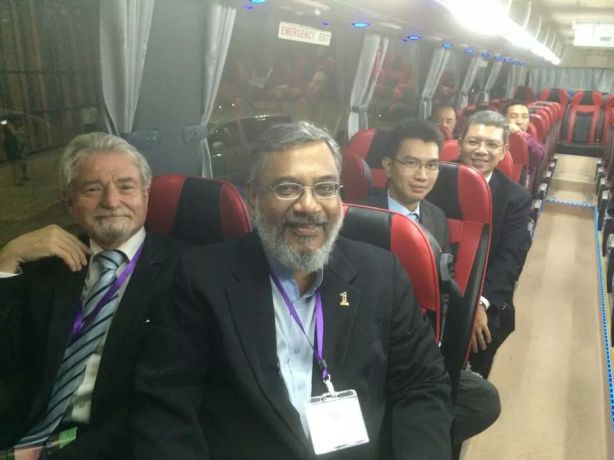By His Highness Tunku ‘Abidin Muhriz
First published in The Borneo Post on 16th May 2014
I write from Nay Pyi Taw (it means Abode of Kings), the new capital of Myanmar, which I was repeatedly told is not representative of the country as a whole. Still, going to a new place is always educational, particularly if it has been in the news in recent yea rs. As consultant editor of a weekly publication produced by the CIMB Asean Research Institute (Cari Captures), I’ve followed from afar the country’s moves towards economic and political liberalisation, the wooing of the international community to be beneficiaries of the resultant new opportunities, the relationship between Aung San Suu Kyi and the civilianised leadership, and the government’s conflict with what it calls “ethnic armed groups”.
Burma, as it is still referred to especially outside Asean, often ranks near the bottom of indices of political and economic freedom, but it’s the idiosyncrasies that hit you when you arrive. At Yangon Airport, I bought an iced tea with crisp US dollar notes — a legacy of when local currency was considered unreliable but due to sanctions, local banks would only accept mint greenbacks. I received tattered local kyat in change.
The disabled toilet was labelled ‘Invalid’, a misspelt use of a word considered archaic even in the UK. A more enduring British legacy were the markers that counted every furlong (220 yards, based on the distance oxen could pull ploughs in medieval England) on the roughly 200-mile road from Yangon to Nay Pyi Taw. I had heard of new eight-lane highways, but unfortunately they were only in the new capital itself: rather incongruously we thought, as our rudimentary van with a flattish tyre hobbled on an older trunk road.
The scenery en route was idyllic: thatched houses dotting paddy fields traversed by buffalo-drawn ploughs, and quaint bridges over picturesque rivers. This romanticism was brutally interrupted at the halfway point at a roadside cafe near vast billboards advertising the official whisky of Chelsea Football Club in Myanmar.
We eventually arrived at our hotel off a boulevard so wide that our plane could have landed on it (if only!). The hotel’s owner was still the target of sanctions which meant that not everyone attending the same forum was able to stay there (it depended on their sponsoring organisation).
The next morning we tried to go sightseeing, starting with the imposing Uppantasanti Pagoda. Unfortunately the subsequent attractions that our taxi driver recommended had such extortionate entry fees (foreigners have to pay 10 times the cost) that we asked him to take us to a local market, but instead he took us to a desolate shopping mall where Lindt chocolate, Tong Garden nuts and iPhones were available.
Tunku ‘Abidin Muhriz with Datuk Saifuddin Abdullah and Datuk Denison Jayasooria (Photo by Fadzmel)
The surreality continued later at the welcoming dinner for the 11th Asean Leadership Forum — my fourth after speaking in Kuala Lumpur in 2010, Jakarta in 2011 and Phnom Penh in 2012 — which took place at an impossibly swank convention centre. There U Thein Sein, President of the Republic (where nonetheless ‘Royal’ seems prefixed to nearly everything) of the Union of Myanmar, told the audience which included the President of Indonesia and Malaysia’s Ministers for Foreign Affairs and International Trade and Industry in his native language that “recent political, economic and administrative reforms have made it possible for Myanmar to play a more active role in regional and international affairs”. The realisation of the Asean Community by 2015 was not a deadline, he said, but a milestone “as we continue to achieve even greater integration across the three pillars”.
He mentioned his government’s Foreign Investment Law “that will provide incentives for foreign investors … lifting and easing sanctions imposed”, education reform, support for small and medium enterprises (“the backbone of the Asean economy”) and climate change.
There was nothing on the South China Sea, which was discussed without any useful conclusion at the Asean Summit just before (though at least in a more face-saving manner than previously). He did, however, say he was “confident that we will be able to sign a nationwide peace agreement with all ethnic-armed groups”.
It took a Malaysian the next day, in the forum proper, to mention the R-word, and in my session on young people chaired by Datuk Saifuddin Abdullah I pointed out (wearing my hat as trustee of Yayasan Chow Kit) that a third of the children at our centres for stateless and refugee children are Rohingya.
All Asean member states have signed the UN Convention on the Rights of the Child and there’s now the Asean Commission for the Protection and Promotion of the Rights of Women and Children, but as ever the real problems derive from geopolitical issues that Asean’s leaders won’t courageously tackle in convenient homage to the Asean Way.
